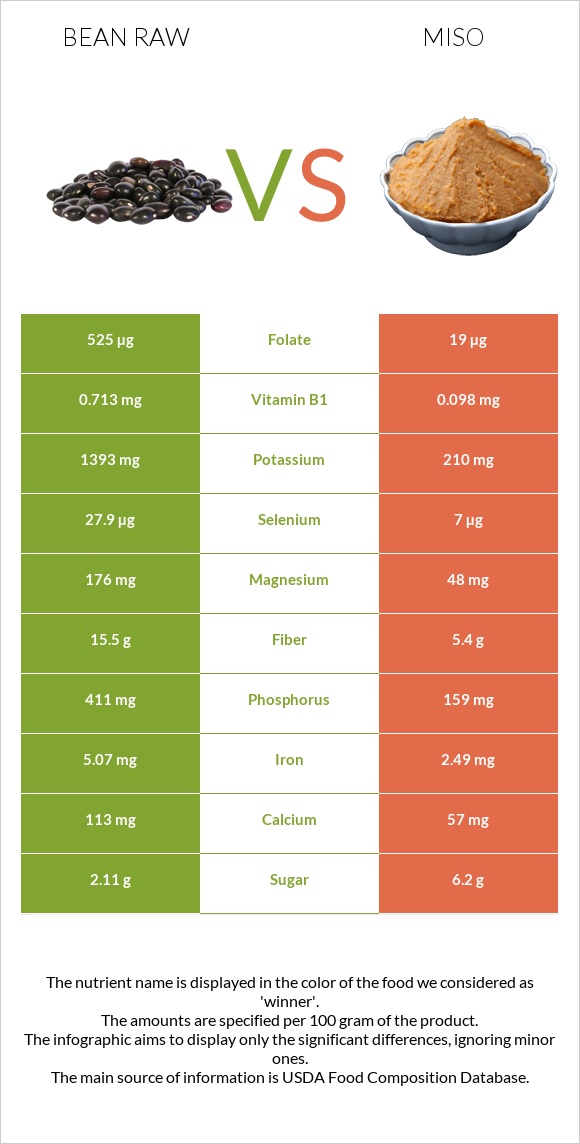Bean raw vs. Miso — In-Depth Nutrition Comparison
Compare
The main differences between bean raw and miso
- Miso contains less folate, copper, vitamin B1, fiber, selenium, phosphorus, potassium, iron, and magnesium than bean raw.
- Daily need coverage for sodium for miso is 162% higher.
- Miso has 28 times less folate than bean raw. Bean raw has 525µg of folate, while miso has 19µg.
- Bean raw is lower in sodium.
- Miso has a higher glycemic index than bean raw.
Food types used in this article are Beans, pinto, mature seeds, raw and Miso.
Infographic

Infographic link
Mineral Comparison
Mineral comparison score is based on the number of minerals by which one or the other food is richer. The "coverage" charts below show how much of the daily needs can be covered by 300 grams of the food.
| Contains more MagnesiumMagnesium | +266.7% |
| Contains more CalciumCalcium | +98.2% |
| Contains more PotassiumPotassium | +563.3% |
| Contains more IronIron | +103.6% |
| Contains more CopperCopper | +112.6% |
| Contains more PhosphorusPhosphorus | +158.5% |
| Contains less SodiumSodium | -99.7% |
| Contains more ManganeseManganese | +33.6% |
| Contains more SeleniumSelenium | +298.6% |
| Contains more ZincZinc | +12.3% |
Vitamin Comparison
Vitamin comparison score is based on the number of vitamins by which one or the other food is richer. The "coverage" charts below show how much of the daily needs can be covered by 300 grams of the food.
| Contains more Vitamin CVitamin C | +∞% |
| Contains more Vitamin EVitamin E | +2000% |
| Contains more Vitamin B1Vitamin B1 | +627.6% |
| Contains more Vitamin B3Vitamin B3 | +29.6% |
| Contains more Vitamin B5Vitamin B5 | +132.9% |
| Contains more Vitamin B6Vitamin B6 | +138.2% |
| Contains more FolateFolate | +2663.2% |
| Contains more Vitamin AVitamin A | +∞% |
| Contains more Vitamin B12Vitamin B12 | +∞% |
| Contains more Vitamin KVitamin K | +423.2% |
All nutrients comparison - raw data values
| Nutrient |  |
 |
DV% diff. |
| Sodium | 12mg | 3728mg | 162% |
| Folate | 525µg | 19µg | 127% |
| Copper | 0.893mg | 0.42mg | 53% |
| Vitamin B1 | 0.713mg | 0.098mg | 51% |
| Fiber | 15.5g | 5.4g | 40% |
| Selenium | 27.9µg | 7µg | 38% |
| Phosphorus | 411mg | 159mg | 36% |
| Potassium | 1393mg | 210mg | 35% |
| Iron | 5.07mg | 2.49mg | 32% |
| Magnesium | 176mg | 48mg | 30% |
| Vitamin B6 | 0.474mg | 0.199mg | 21% |
| Vitamin K | 5.6µg | 29.3µg | 20% |
| Protein | 21.42g | 12.79g | 17% |
| Polyunsaturated fat | 0.407g | 2.884g | 17% |
| Starch | 34.17g | 14% | |
| Manganese | 1.148mg | 0.859mg | 13% |
| Carbs | 62.55g | 25.37g | 12% |
| Vitamin B5 | 0.785mg | 0.337mg | 9% |
| Fructose | 0g | 6g | 8% |
| Calories | 347kcal | 198kcal | 7% |
| Fats | 1.23g | 6.01g | 7% |
| Vitamin C | 6.3mg | 0mg | 7% |
| Calcium | 113mg | 57mg | 6% |
| Saturated fat | 0.235g | 1.025g | 4% |
| Zinc | 2.28mg | 2.56mg | 3% |
| Vitamin B12 | 0µg | 0.08µg | 3% |
| Vitamin B2 | 0.212mg | 0.233mg | 2% |
| Vitamin B3 | 1.174mg | 0.906mg | 2% |
| Monounsaturated fat | 0.229g | 1.118g | 2% |
| Vitamin E | 0.21mg | 0.01mg | 1% |
| Choline | 66.2mg | 72.2mg | 1% |
| Net carbs | 47.05g | 19.97g | N/A |
| Sugar | 2.11g | 6.2g | N/A |
| Vitamin A | 0µg | 4µg | 0% |
| Tryptophan | 0.237mg | 0.155mg | 0% |
| Threonine | 0.81mg | 0.479mg | 0% |
| Isoleucine | 0.871mg | 0.508mg | 0% |
| Leucine | 1.558mg | 0.82mg | 0% |
| Lysine | 1.356mg | 0.478mg | 0% |
| Methionine | 0.259mg | 0.129mg | 0% |
| Phenylalanine | 1.095mg | 0.486mg | 0% |
| Valine | 0.998mg | 0.547mg | 0% |
| Histidine | 0.556mg | 0.243mg | 0% |
Macronutrient Comparison
Macronutrient breakdown side-by-side comparison
| Contains more ProteinProtein | +67.5% |
| Contains more CarbsCarbs | +146.6% |
| Contains more FatsFats | +388.6% |
| Contains more WaterWater | +279.7% |
| Contains more OtherOther | +269.2% |
Fat Type Comparison
Fat type breakdown side-by-side comparison
| Contains less Sat. FatSaturated fat | -77.1% |
| Contains more Mono. FatMonounsaturated fat | +388.2% |
| Contains more Poly. FatPolyunsaturated fat | +608.6% |
Carbohydrate type comparison
Carbohydrate type breakdown side-by-side comparison
| Contains more StarchStarch | +∞% |
| Contains more SucroseSucrose | +∞% |
| Contains more GlucoseGlucose | +∞% |
| Contains more FructoseFructose | +∞% |
| Contains more MaltoseMaltose | +∞% |
~equal in
Lactose
~0g
~equal in
Galactose
~0g